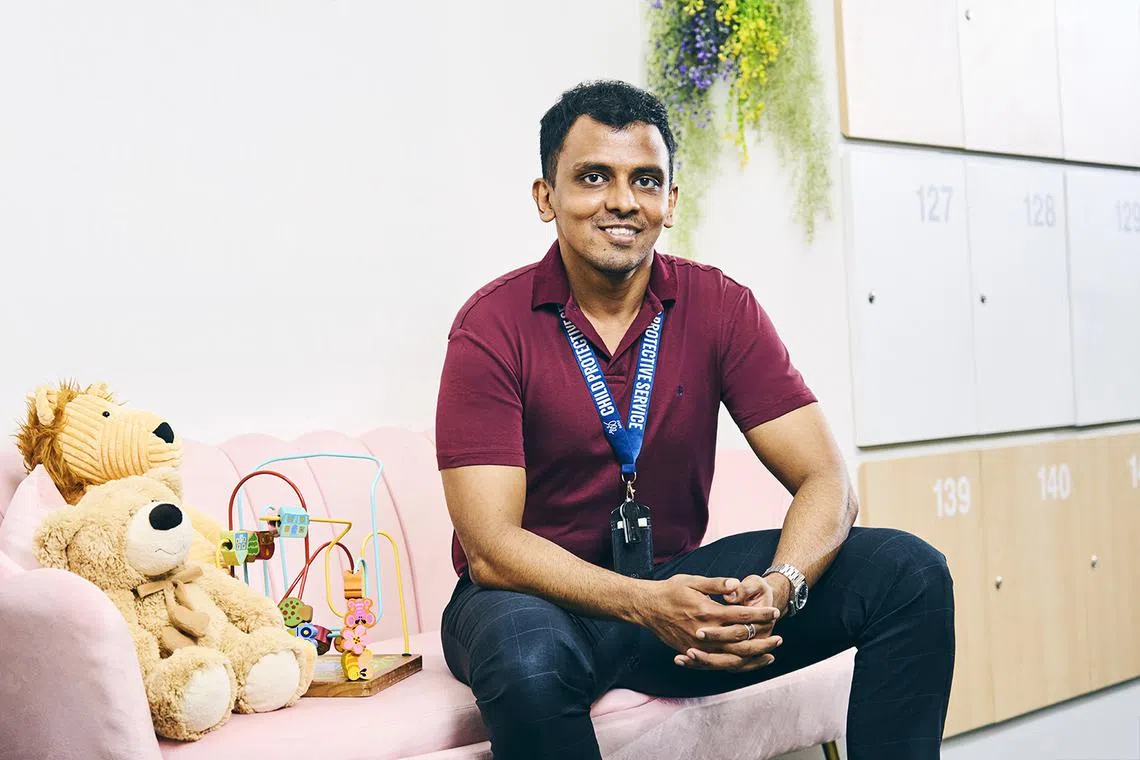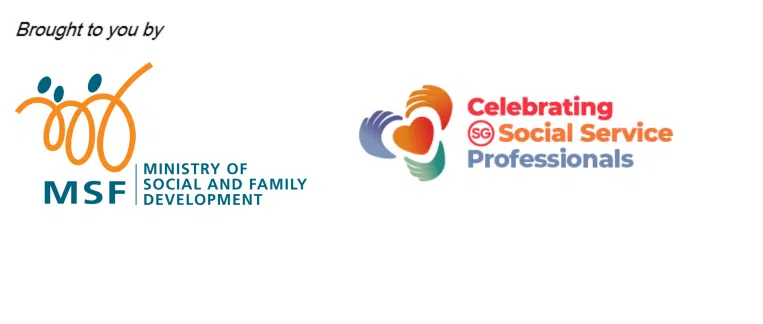BRANDED CONTENT
‘I want to help keep children safe from harm’: How he is helping families heal and grow together
Through patience, collaboration with community partners and tough conversations, protection officer Abdul Roqibu helps families build a safe and nurturing home for children

Protection officer Abdul Roqibu works closely with families to ensure the safety and well-being of children.
PHOTO: SPH MEDIA
When protection officer (PO) Abdul Roqibu first met Aaron (not his real name), the two-year-old was sitting quietly in a corner – thin, withdrawn and barely responsive when others tried to engage him.
Watch this video to find out more about what Mr Roqibu does as a PO.
Aaron had been referred to the Ministry of Social and Family Development’s (MSF)
As a PO with MSF, Mr Roqibu’s job was to step in and help Aaron’s family create a safer home environment for him. The 30-year-old connected Aaron’s parents with relevant agencies that offered parenting guidance, financial assistance and other forms of support.
“It wasn’t easy, and there were setbacks along the way,” says Mr Roqibu, adding that this included moments when tensions in the household threatened to undo all their progress. But over time – and with continued help, including employment support and counselling – the family slowly found their footing.
A year later, Aaron was healthier and happier. “This was one of those cases that really stuck with me,” shares Mr Roqibu, who has spent over four years in his role.
“It reminded me that child protection work isn’t just about addressing harm. It’s about helping families heal and grow together.”
Every day, Mr Roqibu, along with other POs and professionals in the community, work to keep children like Aaron safe. Now a team lead, Mr Roqibu not only helps families directly but also guides a group of POs as they navigate the emotionally demanding work of child protection.
Q: What inspired you to become a PO?
When I was studying psychology at university, I worked with different social service organisations and saw first-hand how children struggle when they do not get the support they need.
This made me want to advocate for vulnerable individuals, especially children.
It was during my internship with MSF where I got to learn more about the work of Child Protective Service* (now PSV). The opportunity to make a direct impact on a child’s life and future was a powerful motivator to join the profession.

Mr Roqibu (back row, fourth from right) with other POs at a team bonding activity.
PHOTO: COURTESY OF ABDUL ROQIBU
Q: What does your job entail?
A big part of my work involves assessing child protection concerns and working closely with families, schools and community partners – such as family service centres and hospitals – to develop safety and case plans that support the child’s well-being.
While each situation is different, POs work closely with multiple partners to assess risk and act in the child’s best interests. Our priority is to work with families to keep children safe at home. But in more challenging cases, where there are serious concerns and families are unwilling to cooperate, I may apply for a court order to protect the child. When that happens, I make recommendations to the court based on what is in the child’s best interests, before the court makes the final decision.
Beyond handling my own caseload, I also support my team of POs as a supervisor. I guide them on investigation strategies, risk assessments and intervention plans. Protection work can be emotionally demanding, so I make it a point to check in on their well-being and ensure they have the support and resources to prevent burnout.

As POs, Mr Roqibu and his team work closely with families and professionals in the community to form case plans, provide interventions and support for families and children.
PHOTO: SPH MEDIA
Q: What are some of the biggest challenges in your job?
One challenge is working with families who deny the allegations or resist intervention. It can be frustrating when there are clear safety concerns for the child, but the family refuses to accept help.
In these situations, I try to respond with patience and empathy, taking the time to understand their perspective, while reinforcing that our goal is to work with them to keep their child safe.
Another difficult part of the job is handling cases of severe abuse or, in the worst situations, the death of a child. These cases are emotionally distressing, which is why it is important to have a strong support system – whether through colleagues, peers or professional counselling.
Q: How do you stay resilient in such an emotionally demanding job?
Self-care is key. I make sure to set time aside to exercise, play video games and travel to recharge and unwind.
For my team, I try to create a safe space where they can speak openly about their stressors and how they are coping. It is important to have check-ins with my team and to remind each other that we are not in this alone.

Apart from playing video games and travelling, Mr Roqibu (back row, third from left) also unwinds by spending time with his colleagues after work, taking part in different activities like football.
PHOTO: COURTESY OF ABDUL ROQIBU
Q: What are some misconceptions that people may have about protection work?
One common misconception is that POs are there to remove children from their families. In reality, our main goal is to help families make the necessary changes to keep their children safe at home. Removal is always a last resort. Even when a child is placed in alternative care, we continue working with the family to support safe reunification.
Another misconception is that we are harsh, or that our role is to punish families. In fact, we work closely with them – offering support, guidance and resources to help improve their situation. Our approach is centred on support, not punishment.
Q: What are some of the key skills required to be successful in your role?
Having patience, empathy, good communication skills and the ability to stay calm under pressure are essential.
We often step in during difficult periods for the family. Being non-judgmental and showing empathy helps us build trust so they know we are here to help, not to judge. That trust is key to working together to keep children safe.
Q: What advice would you give to someone who is interested in pursuing this career?
Take care of yourself first before you take care of others. This is a rewarding career, but self-care is essential to sustaining your ability to support children and families in the long run.
You also have to be prepared for emotional challenges, but do not lose sight of the impact you can make. Compassion and resilience go hand in hand in this profession.
There are tough days, but then there are cases like Aaron’s – when a child finds their footing and begins to thrive. Knowing I played a part in that is what keeps me going. I want to help keep children safe from harm.
Celebrating social service professionals
The Ministry of Social and Family Development (MSF) has designated 2025 as its Year of Celebrating Social Service Professionals, recognising the vital contributions of over 20,000 professionals in the sector who support families and communities.
At the heart of this effort is the Social Service Tribe – a movement led by the National Council of Social Service – which brings together like-minded professionals dedicated to empowering communities and improving lives.
As part of ongoing efforts to strengthen the sector, MSF will partner with the new School of Social Work and Social Development at the Singapore University of Social Sciences (SUSS) to enhance practicums in MSF’s protective services. This initiative is aimed at social work undergraduates who choose protection as their area of concentration.
The enhanced practicum will equip students with essential skills and experience in protection work – much like how Mr Abdul Roqibu gained hands-on experience during his internship with MSF. The partnership is expected to strengthen capabilities in the field and support the advancement of social work practice in Singapore.
*Since May 2025, child and adult protective services have merged under the Ministry of Social and Family Development’s Protective Service to improve service delivery and strengthen outcomes for families impacted by domestic violence.



